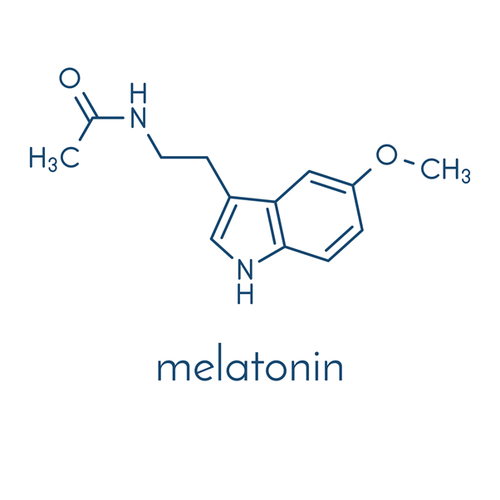
Background
Darkness triggers the body to make more melatonin, which signals the body to sleep. Light decreases melatonin production and signals the body to be awake. Some people who have trouble sleeping have low levels of melatonin. It's thought that adding melatonin from supplements might help them sleep.
People most commonly use melatonin for insomnia and improving sleep in different conditions, such as jet lag. It is also used for depression, chronic pain, dementia, and many other conditions, but there is no good scientific evidence to support most of these uses. There is also no good evidence to support using melatonin for COVID-19.
Safety Safety definitions
When applied to the skin: Melatonin is likely safe for most adults when used short-term.
Special Precautions & Warnings:
Pregnancy: Melatonin is possibly unsafe when regularly taken by mouth or in high doses while trying to become pregnant. Melatonin might have effects similar to birth control, making it more difficult to become pregnant. There isn't enough reliable information to know if melatonin is safe to use when pregnant. Until more is known, it's best not to use melatonin while pregnant or trying to become pregnant.Breast-feeding: There isn't enough reliable information to know if melatonin is safe to use when breast-feeding. Stay on the safe side and avoid use.
Children: Melatonin is possibly safe when taken by mouth, short-term. Melatonin is usually well tolerated when taken in doses up to 3 mg daily in children and 5 mg daily in adolescents. There is some concern that melatonin might interfere with development during adolescence. Melatonin should only be used in children with a medical need. There isn't enough evidence to know if melatonin is safe in children when taken by mouth, long-term.
Bleeding disorders: Melatonin might make bleeding worse in people with bleeding disorders.
Depression: Melatonin can make symptoms of depression worse.
High blood pressure: Melatonin can raise blood pressure in people who are taking certain medications to control blood pressure. Avoid using it.
Seizure disorders: Using melatonin might increase the risk of having a seizure.
Transplant recipients: People who have had a transplant often take medications to suppress the immune system. Melatonin can increase immune function. This might interfere with the effects of some transplant medications.
Effectiveness
- Trouble falling asleep at a conventional bedtime (delayed sleep phase syndrome). Taking melatonin by mouth seems to shorten the time needed to fall asleep in young adults and children with this condition.
- Non-24-hour sleep wake disorder. Taking melatonin by mouth at bedtime seems to improve sleep in children and adults who are blind.
- Sleep disturbance caused by certain blood pressure medicine (beta blocker-induced insomnia). Taking melatonin by mouth might reduce sleep problems in people taking beta-blocker drugs.
- Cancer. Taking high doses of melatonin by mouth or as a shot, administered by a healthcare provider along with chemotherapy or other cancer treatments, might reduce tumor size and improve survival rates in some people with cancer.
- Confusion and agitation after surgery. In children receiving a medication called sevoflurane during surgery, taking melatonin by mouth before anesthesia might help to prevent anxiety and agitation while waking up. The effect of taking melatonin in adults undergoing surgery is unclear.
- High blood pressure. Taking the controlled-release form of melatonin by mouth before bedtime seems to lower blood pressure in people with high blood pressure. Immediate-release products don't seem to work.
- Insomnia. Taking melatonin by mouth, short-term, seems to shorten the time it takes to fall asleep in people with insomnia, but only by about 7-12 minutes. It's not clear if it affects the amount of time spent sleeping. It also seems to be more helpful in older adults and those with certain other conditions.
- Jet lag. Taking melatonin by mouth can improve certain symptoms of jet lag such as alertness and reduce daytime sleepiness and tiredness. But it might not help shorten the time it takes for people with jet lag to fall asleep.
- Migraine. Taking melatonin by mouth before bed can prevent migraines in adults and children. It's not clear if melatonin helps to treat migraines.
- Anxiety before a procedure. Taking melatonin by mouth or under the tongue somewhat reduces anxiety before surgery in adults. It's not clear if it helps in children.
- Sedation before a procedure. Taking melatonin by mouth might reduce the amount of sedatives needed for some medical procedures in children.
- Sunburn. Applying melatonin gel to the skin before sun exposure seems to help prevent sunburn.
- A group of painful conditions that affect the jaw joint and muscle (temporomandibular disorders or TMD). Taking melatonin by mouth at bedtime for 4 weeks reduces pain in females with jaw pain.
- Low levels of platelets in the blood (thrombocytopenia). Taking melatonin by mouth can improve low blood platelet counts associated with cancer, cancer treatment, and other disorders.
- Withdrawal from drugs called benzodiazepines. Taking melatonin by mouth at bedtime doesn't reduce withdrawal symptoms in people with insomnia who have stopped taking these drugs.
- Depression. Taking melatonin by mouth doesn't seem to reduce symptoms of depression, and might make symptoms worse in some people.
- Athletic performance. Taking melatonin by mouth shortly before resistance exercise or cycling doesn't appear to improve performance.
- Involuntary weight loss in people who are very ill (cachexia or wasting syndrome). Taking melatonin by mouth doesn't improve appetite, body weight, or body composition in people with wasting syndrome from cancer.
- Tiredness in people with cancer. Taking melatonin by mouth doesn't seem to improve tiredness in people with cancer.
- Pain in people with cancer. Taking melatonin by mouth doesn't seem to reduce pain in people with cancer.
- Critical illness (trauma). Taking melatonin by mouth doesn't seem to shorten hospital stay in people that are critically ill.
- Diseases, such as Alzheimer disease, that interfere with thinking (dementia). Taking melatonin by mouth doesn't improve behavior or affect symptoms in people with Alzheimer disease or other forms of memory loss. But it might reduce confusion when the sun goes down in people with these conditions.
- Inability to become pregnant within a year of trying to conceive (infertility). Taking melatonin by mouth doesn't seem to improve pregnancy rates in females undergoing fertility treatments.
- Sleep disorder due to rotating or night shifts (shift work disorder). Taking melatonin by mouth doesn't seem to improve sleeping problems in people who do shift work.
Dosing & administration
Some melatonin supplements are slow-release and others are fast-release. Some melatonin products can be placed under the tongue or in the cheek to absorb faster. Melatonin is also used in creams, gargles, and gels. Speak with a healthcare provider to find out what type of product and dose might be best for a specific condition.
Interactions with pharmaceuticals
Birth control pills (Contraceptive drugs)
Interaction Rating=Moderate Be cautious with this combination.
Birth control pills seem to increase how much melatonin the body makes. Taking melatonin along with birth control pills might increase the effects and side effects of melatonin.
Caffeine
Interaction Rating=Moderate Be cautious with this combination.
Caffeine might increase or decrease melatonin levels in the body. When taken together with melatonin supplements, caffeine seems to increase melatonin levels.
Flumazenil (Romazicon)
Interaction Rating=Minor Be watchful with this combination.
Flumazenil might decrease the effects of melatonin. Taking flumazenil along with melatonin might decrease the effects of melatonin supplements.
Fluvoxamine (Luvox)
Interaction Rating=Moderate Be cautious with this combination.
Taking fluvoxamine can increase the amount of melatonin that the body absorbs. Taking melatonin along with fluvoxamine might increase the effects and side effects of melatonin.
Medications changed by the liver (Cytochrome P450 1A2 (CYP1A2) substrates)
Interaction Rating=Moderate Be cautious with this combination.
Some medications are changed and broken down by the liver. Melatonin might change how quickly the liver breaks down these medications. This could change the effects and side effects of these medications.
Medications changed by the liver (Cytochrome P450 2C19 (CYP2C19) substrates)
Interaction Rating=Moderate Be cautious with this combination.
Some medications are changed and broken down by the liver. Melatonin might change how quickly the liver breaks down these medications. This could change the effects and side effects of these medications.
Medications changed by the liver (Cytochrome P450 2D6 (CYP2D6) substrates)
Interaction Rating=Minor Be watchful with this combination.
Some medications are changed and broken down by the liver. Melatonin might change how quickly the liver breaks down these medications. This could change the effects and side effects of these medications.
Medications changed by the liver (Cytochrome P450 3A4 (CYP3A4) substrates)
Interaction Rating=Minor Be watchful with this combination.
Some medications are changed and broken down by the liver. Melatonin might change how quickly the liver breaks down these medications. This could change the effects and side effects of these medications.
Medications for diabetes (Antidiabetes drugs)
Interaction Rating=Moderate Be cautious with this combination.
Melatonin might lower blood sugar levels. Taking melatonin along with diabetes medications might cause blood sugar to drop too low. Monitor your blood sugar closely.
Medications for high blood pressure (Antihypertensive drugs)
Interaction Rating=Moderate Be cautious with this combination.
Melatonin might lower blood pressure. Taking melatonin along with medications that lower blood pressure might cause blood pressure to go too low. Monitor your blood pressure closely.
Medications that decrease the immune system (Immunosuppressants)
Interaction Rating=Moderate Be cautious with this combination.
Melatonin can increase the activity of the immune system. Some medications, such as those used after a transplant, decrease the activity of the immune system. Taking melatonin along with these medications might decrease the effects of these medications.
Medications that increase the chance of having a seizure (Seizure threshold lowering drugs)
Interaction Rating=Moderate Be cautious with this combination.
Melatonin might increase the risk of seizures in some people. There are also some medications that can increase the risk of seizures. Taking these products together might increase the risk of a seizure even more.
Medications that slow blood clotting (Anticoagulant / Antiplatelet drugs)
Interaction Rating=Moderate Be cautious with this combination.
Melatonin might slow blood clotting. Taking melatonin along with medications that also slow blood clotting might increase the risk of bruising and bleeding.
Medications used to prevent seizures (Anticonvulsants)
Interaction Rating=Moderate Be cautious with this combination.
Melatonin may increase the risk of seizures. Therefore, taking melatonin may decrease the effects of medications used to prevent seizures. This might increase the risk of seizures.
Methamphetamine (Desoxyn)
Interaction Rating=Moderate Be cautious with this combination.
Taking melatonin with methamphetamine might increase the effects and side effects of methamphetamine.
Nifedipine GITS (Procardia XL)
Interaction Rating=Moderate Be cautious with this combination.
Nifedipine GITS is used to lower blood pressure. Taking melatonin might decrease the effects of nifedipine GITS for lowering blood pressure.
Sedative medications (CNS depressants)
Interaction Rating=Moderate Be cautious with this combination.
Melatonin might cause sleepiness and slowed breathing. Some medications, called sedatives, can also cause sleepiness and slowed breathing. Taking melatonin with sedative medications might cause breathing problems and/or too much sleepiness.
Warfarin (Coumadin)
Interaction Rating=Moderate Be cautious with this combination.
Warfarin is used to slow blood clotting. Melatonin might increase the effectiveness of warfarin. Taking melatonin along with warfarin might increase the chances of bruising and bleeding. Be sure to have your blood checked regularly. The dose of your warfarin might need to be changed.
Interactions with herbs & supplements
Herbs and supplements that might lower blood pressure: Melatonin might lower blood pressure. Taking it with other supplements that have the same effect might cause blood pressure to drop too much. Examples of supplements with this effect include andrographis, casein peptides, L-arginine, niacin, and stinging nettle.
Herbs and supplements that might lower blood sugar: Melatonin might lower blood sugar. Taking it with other supplements with similar effects might lower blood sugar too much. Examples of supplements with this effect include aloe, bitter melon, cassia cinnamon, chromium, and prickly pear cactus.
Herbs and supplements that might lower seizure threshold: Melatonin might increase the risk for seizures. Taking it along with other supplements with similar effects might increase the risk for seizures even more. Examples of supplements with this effect include caffeine, evening primrose, L-carnitine, melatonin, and sage.
Herbs and supplements that might slow blood clotting: Melatonin might slow blood clotting and increase the risk of bleeding. Taking it with other supplements with similar effects might increase the risk of bleeding in some people. Examples of supplements with this effect include garlic, ginger, ginkgo, nattokinase, and Panax ginseng.
Herbs and supplements with sedative properties: Melatonin might cause sleepiness and slowed breathing. Taking it along with other supplements with similar effects might cause too much sleepiness and/or slowed breathing in some people. Examples of supplements with this effect include hops, kava, L-tryptophan, and valerian.
Vitex agnus-castus: Taking vitex agnus-castus increases melatonin levels in the body. Taking vitex agnus-castus with melatonin might increase the effects and side effects of melatonin.






